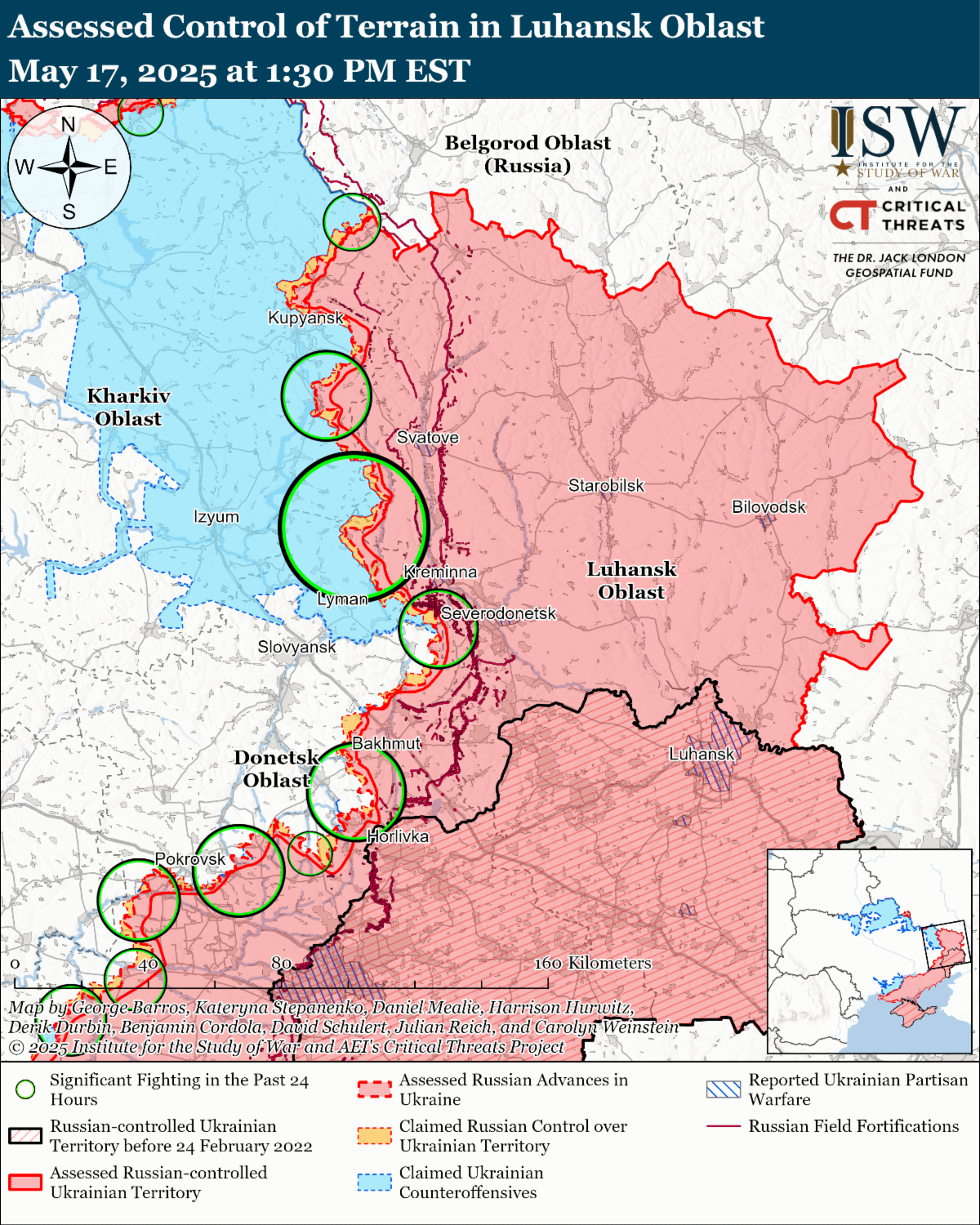The Russian delegation in Istanbul reportedly framed its demands for a final peace settlement as preconditions that Ukraine must meet before Russia will agree to a ceasefire. Most of Russia's demands are contrary to US President Donald Trump's proposed peace plan. Sources familiar with the May 16 Ukrainian–Russian talks in Istanbul reported to Bloomberg that the Russian delegation demanded that Ukraine cede all of Luhansk, Donetsk, Zaporizhia, and Kherson oblasts and Crimea to Russia and that the international community recognize the four oblasts and the peninsula as Russian territory before Russia will agree to a ceasefire. The Russian delegation also reportedly demanded that Ukraine adopt a neutral status, that no foreign troops be allowed on Ukrainian territory, and that Ukraine abandon its demands for war reparations from Russia. Chairperson of the Russian Federation Council's Committee on Foreign Affairs Grigory Karasin stated on May 17 that the Russian delegation maintained Russian President Vladimir Putin's June 2024 demands, including that Ukrainian forces withdraw from the entirety of the four oblasts and abandon its NATO aspirations before Russia would agree to a ceasefire and peace negotiations. The United States reportedly presented Russia in April 2025 with a seven-point peace plan that offered Russia "de jure" US recognition of Russian sovereignty over occupied Crimea and "de facto" recognition of Russian control over the parts of Ukraine that Russian forces currently occupy. The US proposal also reportedly included "a robust security guarantee" involving a group of European states and possibly non-European states as a likely peacekeeping force. The Russian delegation's demands in Istanbul outright reject these aspects of the US peace proposal.
ISW continues to assess that Russia's war aim remains full Ukrainian capitulation. Russia is reframing its territorial demands — typically the subject of war termination negotiations — as preconditions for a ceasefire. Russia is attempting to posture itself as open to negotiations but is putting forward demands that Ukraine cannot reasonably accept while offering no compromises of its own. ISW continues to assess that Putin will continue to refuse to offer compromises until Ukraine and the West are able to alter his theory of victory, which posits that Russia will win a war of attrition through indefinite creeping advances that prevent Ukraine from conducting successful, operationally significant counteroffensive operations.
Russia's continued protraction of negotiations emphasizes its unwillingness to engage in good-faith negotiations for either a ceasefire or a final peace agreement. Kremlin Spokesperson Dmitry Peskov stated on May 17 that Russian President Vladimir Putin and Ukrainian President Volodymyr Zelensky may meet only if the Russian and Ukrainian delegations reach unspecified agreements and underscored that all talks should be conducted behind closed doors. Peskov's statements are likely intentionally vague in order to further delay progress in Russian-Ukrainian talks. Russian opposition outlet Verstka reported on May 17 that a source close to the Russian Presidential Administration stated the Kremlin viewed discussions between Putin and Zelensky as "out of the question" as Moscow knew that the conditions it was pushing Ukraine to accept were non-starters for Kyiv. Another Verstka source close to the Russian Ministry of Foreign Affairs (MFA) similarly stated that Russian officials do not plan to discuss preparations for a Putin-Zelensky meeting. Russia has doubled down on its efforts to protract peace processes by continuing to present Ukraine with ultimatums that Ukraine cannot accept. The Verstka source close to the Presidential Administration added that Russia's demand that the Ukrainian–Russian talks occur without a mediator shows that the Kremlin seeks to demonstrate that it is capable of demanding that the United States limit the influence of Ukraine's Western partners. Peskov's comments and Verstka's report cohere with ISW's long-standing assessment that Russia remains committed to prolonging peace negotiations so as to continue making battlefield advances and to extract additional concessions from the West. Ukraine has continually demonstrated its willingness to compromise and engage in good-faith negotiations in contrast.
Key Takeaways:
- The Russian delegation in Istanbul reportedly framed its demands for a final peace settlement as preconditions that Ukraine must meet before Russia will agree to a ceasefire. Most of Russia's demands are contrary to US President Donald Trump's proposed peace plan.
- Russia's continued protraction of negotiations emphasizes its unwillingness to engage in good-faith negotiations for either a ceasefire or a final peace agreement.
- Kremlin officials continue to signal that Russia is prepared to continue or even escalate its war against Ukraine should Ukraine and the West not agree to Russia's demands for Ukraine's surrender.
- Russia continues to deny the current Ukrainian government's legitimacy and is likely setting conditions to renege on any future Ukrainian–Russian peace agreement.
- Ukrainian forces recently advanced near Lyman, and Russian forces recently advanced near Chasiv Yar, Toretsk, Pokrovsk, Novopavlivka, and Kurakhove.
| 




 [ISW] 러시아의 공세 캠페인 평가, 2025년 5월 18일
[ISW] 러시아의 공세 캠페인 평가, 2025년 5월 18일